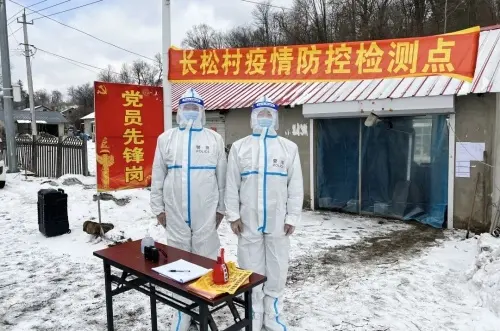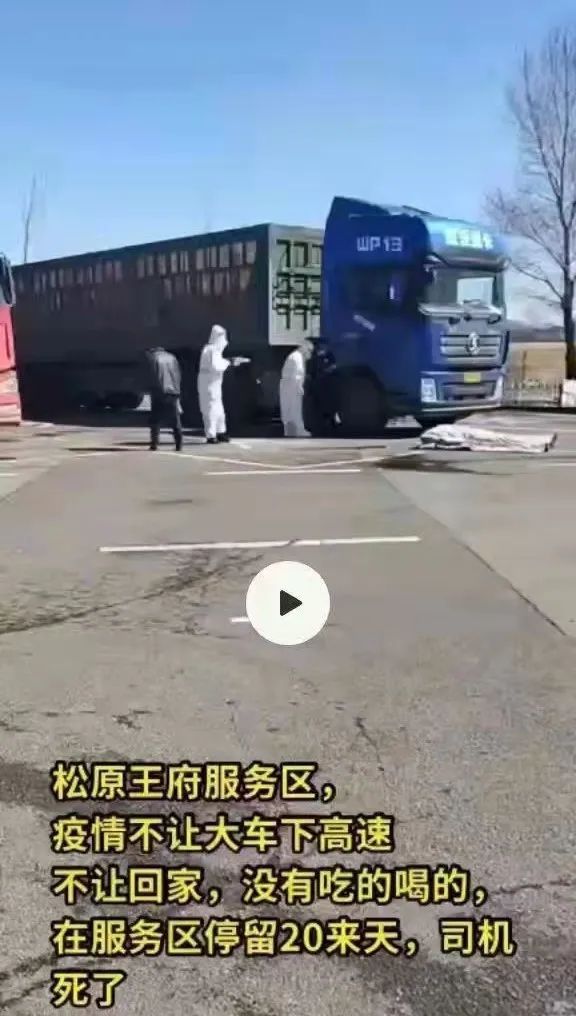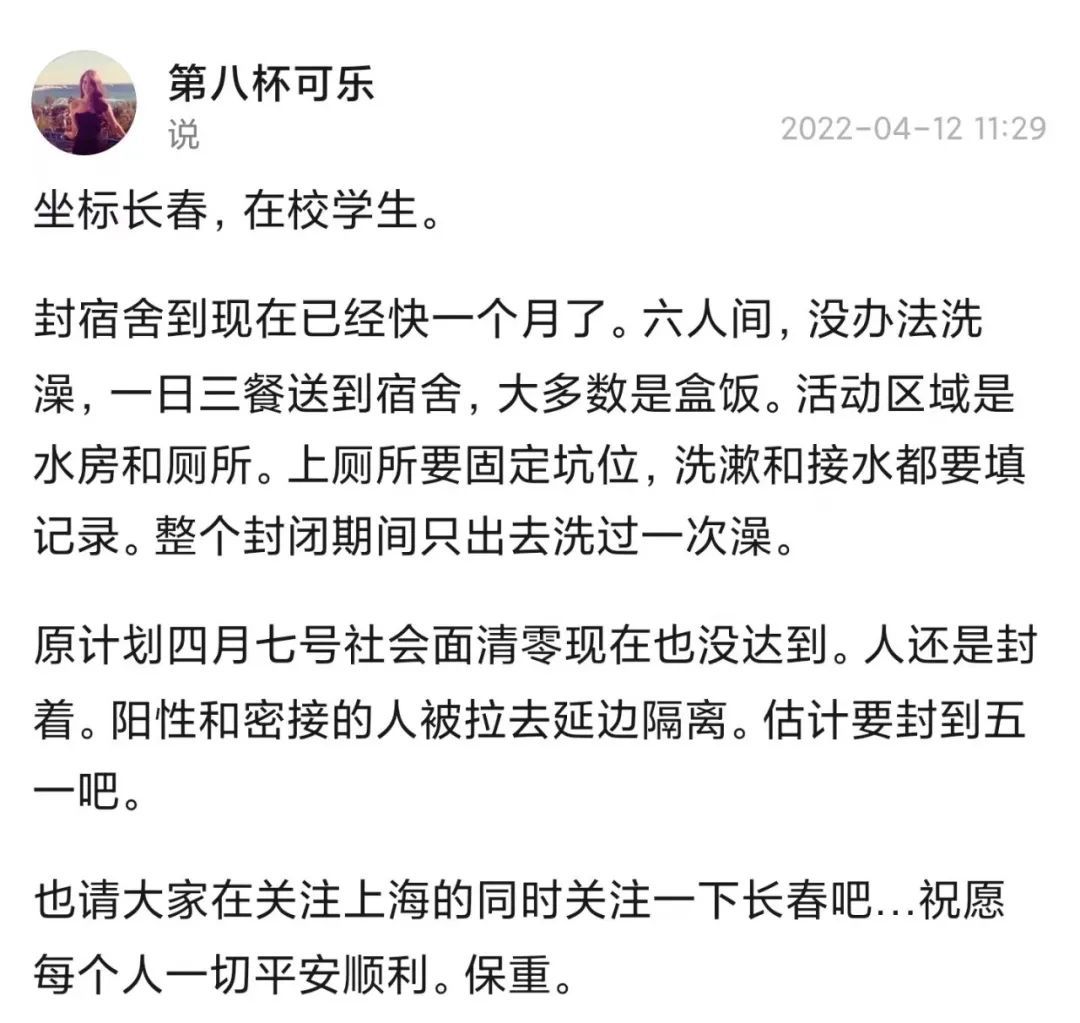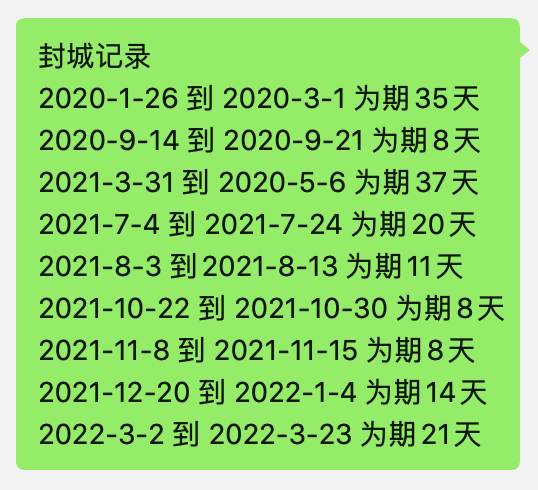
where no sound

A reader said to me: "Actually, I've been waiting for you to write about our Jilin. I'm very disappointed, and I haven't been able to wait until now. It's not just the people in Shanghai who are suffering, our small places are even more tragic, it's just that the outside world doesn't know it. The population of Jilin province is similar to that of Shanghai, but we can't make a sound, and we can't even get a hot search on the Internet. We are also human, so why do we have to endure it silently and die on our own?"
Indeed, we cannot avoid the question: "Aren't they innocent of those who want to make a sound but can't, and it's useless to make a sound?"
Believe me, I have also been following the epidemic in Jilin, but there are too few local sources of information (only two friends talk to me from time to time), there are even fewer useful public reports, and there is a lack of many reliable details. , I can't write any flowers.
This round of epidemic situation in Jilin is fierce. It announced the closure of the province on March 12. Even though some small counties have never had a case in the following month, they still closed the city and all social life was suspended. However, there is almost no news from these places on the Internet, which seems to be a black hole in the field of public opinion.

Occasionally there are a few surprising events that break the curtain of silence. On March 31, an online video stated that due to the high-speed closure of the Wang Mi service area in Songyuan City, Jilin Province, a truck driver was suspected of being trapped in the car for more than 20 days without food, and finally died suddenly in the car. This tragic and bizarre death once attracted public attention, but without seeing the follow-up reports of the incident, it quickly disappeared on the noisy Internet.
On April 9, it was reported on the Internet that Wang, a resident of Changchun Rongqiao No. 1, called for a "knock pot operation" in the owner group, but what she was waiting for was not materials, but was detained by the public security for seven days and fined 300 yuan. The reason is that "under the circumstance that the government guarantees living materials", "the intention is to put pressure on the government, and the nature is bad and the impact is serious".
This time, there were many recordings in Shanghai, whether it was people who called experts from the CDC, complained to the neighborhood committee, or talked to the epidemic prevention personnel, but a friend from Northeast China said to me: "Jilin has been blocked for so long, you Did you see any recordings? No, let alone you, I didn't even see it."
Silence can also be a cry. The human heart is full of flesh, people are not without pain, but they can't say it, or they are quickly stopped when they say it, or they don't make such calls at all, because based on their knowledge of the local situation, they are wise Realize that even if you hit it, it's useless.
On the eve of the local announcement of "social zero", a friend in Changchun told me that he was very depressed when he saw the hardships of the people around him: "The epidemic in Jilin is much more serious than what can be seen in the reports, and I am in the middle of it. , angered, broken, and deserved. This Jilin epidemic, compared to the past, looking at the present and thinking about the future, seems to have no possibility of change."

The situation of Jilin people is a microcosm of the situation of people in many places under the epidemic - compared with Shanghai, it may be more representative. Their common feature is that they rarely stand in the spotlight at the center of the stage on weekdays, and even if they suffer, they still fail to get such an opportunity to express their voices.
How serious this situation is can be seen from one detail: I heard that in hospitals in some provincial capital cities, doctors even feel idle now, because after the large-scale closure of the counties and cities, ordinary people cannot go to the provincial capital to see a doctor. . Even if you can enter the provincial capital, if you go out and can't come back, then no one dares to accept it, then it will be embarrassing. It is conceivable that those places also encountered difficulties in seeking medical treatment, but people silently digested it by themselves.
It wasn't until a few days ago that Yicai's article " Omicoron Blockade in Small Fourth-Tier Cities " let many people, including me, know that Huainan City, Anhui Province, has actually been fighting the war since March 28. All communities have implemented closed management - the same day as Shanghai Pudong. Those in the county towns sandwiched between the urban and rural areas are under the greatest psychological pressure, but even the locals don't seem to know what to do in the face of such isolation.
Under the "foreign defense import" policy, those border trade cities suffer the most. Suifenhe, Heilongjiang, has been closed for 60 days, silently. It was only an unfortunate incident a while ago that made people pay attention: On April 4, the self-media "Letter from Katyusha" broke out that Shi Jun, a surgeon at Jidong County People's Hospital, received a doctor from Suifenhe. The patient (this person used his mother's negative nucleic acid report to get away with it), which led to the spread of the epidemic in the county. Afterwards, as the direct person in charge, he was humiliated and handcuffed and shackled for a medical examination in the hospital. Unbearable, he used a toothbrush to sever his femoral artery suicide.
There is also Dongxing in Guangxi. This small town across the river from Vietnam used to be prosperous due to border trade, but now it is empty. A few days ago, someone called for help on the Internet: "Have we been forgotten in Dongxing City, Guangxi? After two epidemics, more than 40 days have passed since the first epidemic, and there are new ones. My mentality is broken. Staying at home every day, I can't tell what day of the week it is today....Does anyone outside really know about our city? Know that we have been blocked for so long?"
However, if it is miserable, it may be Ruili, Yunnan that is really miserable : after the outbreak of the epidemic in Myanmar, in order to defend the national defense line, Ruili has experienced as many as 9 closures in the past two years, and the urban area has been closed for an astonishing 160 sky! Every village along the border has set up checkpoints to prohibit entry and exit, and many villagers have not gone out for nearly a year. They gritted their teeth, and so far they have overflowed the province without exception, but the residents have done nucleic acid tests hundreds of times at home and still can't move.

Why do people have a hard time making a sound? A lot of people say it's because they are more patient and they don't have a channel to speak up, and no one hears what they say, but I don't think that's the whole reason.
I found that many people would say: "We can't do anything in a small place." Behind this "endurance" is a fatalistic attitude: if there is a way, I don't want it, but now there is no way, I can only accept it.
EP Thompson said in Common Habits that there was no commotion during the Bengal famine of 1866, when "many rural households slowly starved to death without a single complaint or sign of resentment". This fatalistic attitude is sometimes mistaken for apathy or submissiveness, but it is because people feel they have no choice.
He pointedly pointed out that: "Of course, hungry rioters are hungry, but hunger does not dictate that they must riot, nor does it determine the form of turbulence."
This is exactly what we are seeing right now. Some people even glorify this ability to endure hardship and sneer at me: "What do you Shanghai people have to say? Do you suffer a lot? We suffer even more, but we just don't talk about it."
In the past, people's general feeling seemed to be that under the one-size-fits-all and layer-by-layer epidemic prevention, small places have fewer resources and stricter measures, but it is more difficult for people to solve their own problems and listen to their own sufferings; however, this time, many people found that , a similar situation even appeared in Shanghai, and they sighed: "After all, Shanghai is also in China."
This feeling of "all the same" may give some relief to the powerless, because when you find that everyone is "suffering equally", you will feel that your current situation is not so unbearable, and some people are even very happy. It's a very specific kind of resentment: "Let you have a taste of what I have tasted."

Even so, the focus of many people is still not the suffering itself, but the shocking discovery that even if the people of Shanghai suffer from the closure of the city, they still get much more attention. There are many pictures on the Internet mocking this inequality: Shanghainese are not necessarily the most miserable, they just scream the loudest, and as a result they get disproportionate attention.
However, all suffering together equally doesn't actually make things any better. At this moment, the most important thing to realize is that none of us should suffer like this, and to drive change, we must speak up as much as possible.
Why did China abolish the agricultural tax? Because the burden is too heavy, the peasants are forced to rush. However, studies have shown that in the areas with the heaviest burdens, farmers are often obedient to pay, and the most fierce resistance is the Zhejiang farmers, who demanded in exchange for public services, and owed agricultural taxes without services. In fact, the situation of farmers in Zhejiang is not the best in the country, at least they are at the forefront, and they forced the grassroots government to make concessions in exchange for better public services, which further improved their own situation.
The purpose of speaking out should not be just to tell the grievances, but nothing happened after that, or just to get better care from the parents, but to promote change. For this reason, some friends from other places told me this time, "We can't make a sound, and it's impossible for us here. Thank you Shanghai people for calling out. We still have to rely on Shanghai to promote change."
Of course, this is not something that can be done by Shanghai alone. It requires the cry of each of us.
Like my work?
Don't forget to support or like, so I know you are with me..
Comment…